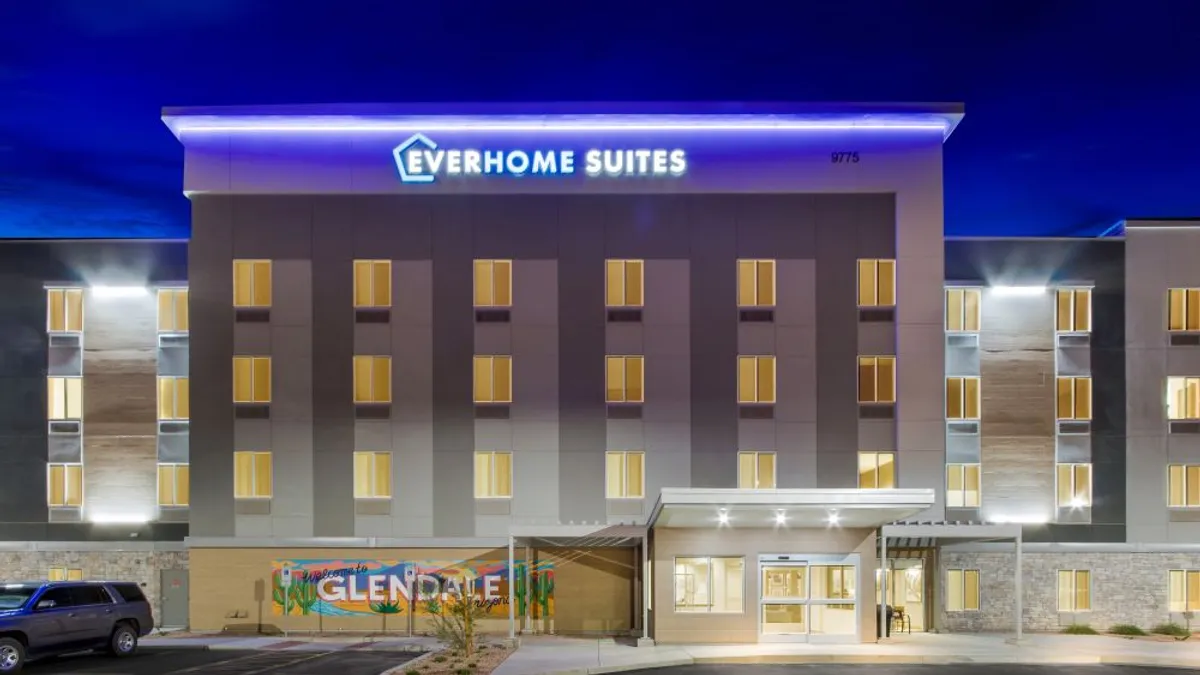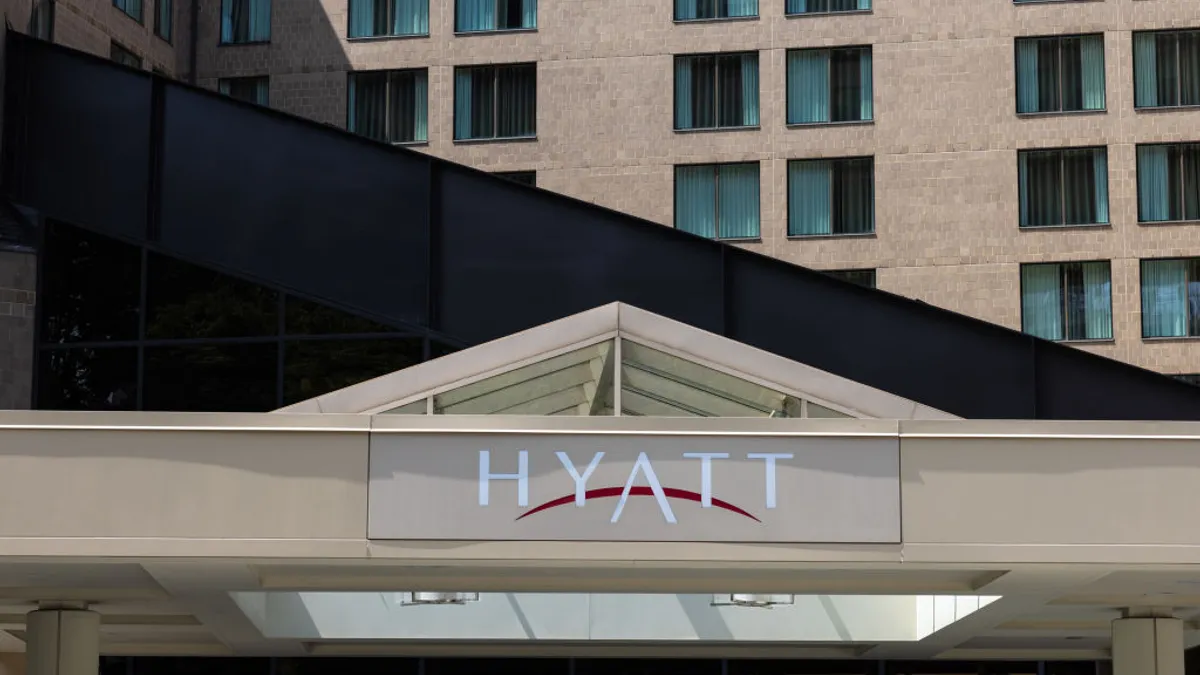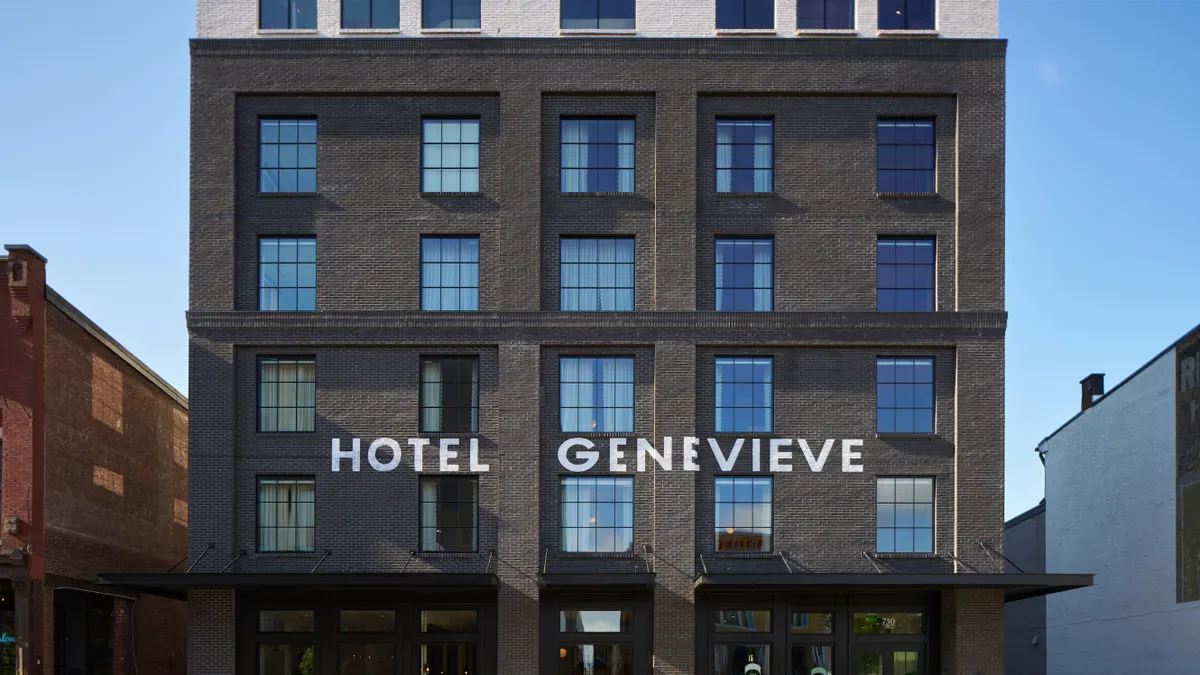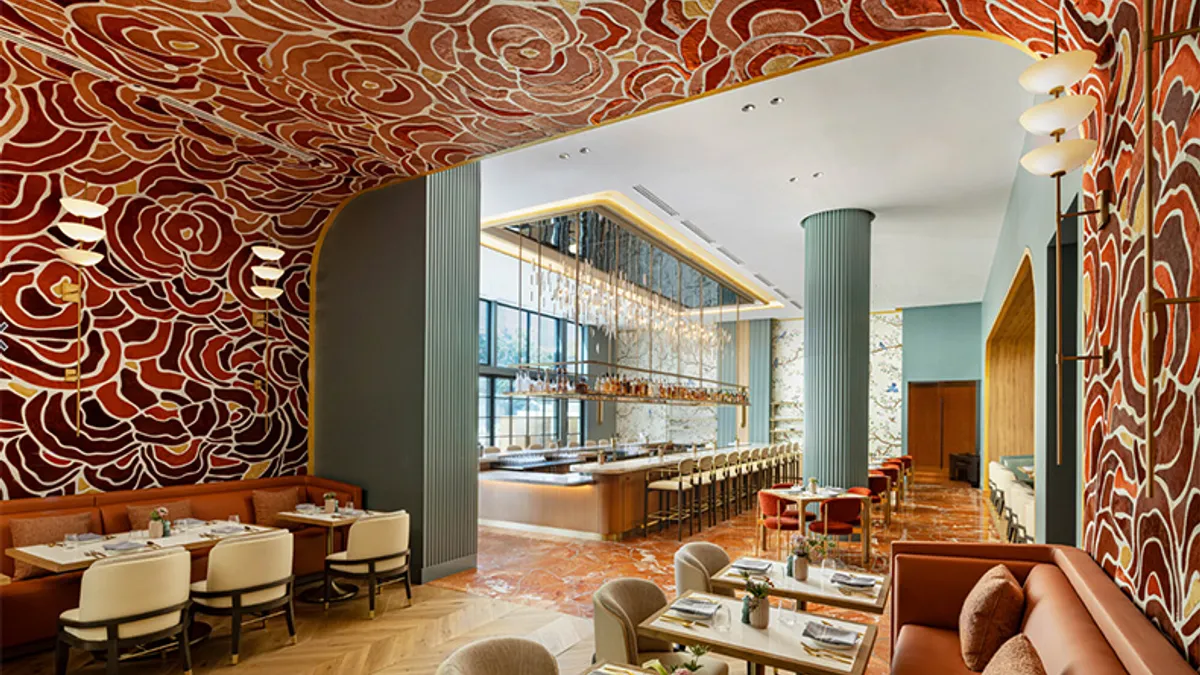As extended stay remains the “darling” of the hospitality industry, Choice Hotels International marks a milestone in the category’s portfolio growth.
On Wednesday, Choice unveiled the 500th addition to its extended stay portfolio, an Everhome Suites hotel in Glendale, Arizona. Per the company, the opening positions Choice’s extended stay portfolio ahead in size of hotel competitors also expanding in the space.
The milestone opening is more than 20 years in the making: Choice has been an active player in extended stay since the mid-’90s, according to Matt McElhare, vice president and lead for extended stay brands at Choice Hotels. But the company’s extended stay growth skyrocketed in 2018, McElhare noted, when it acquired WoodSpring Suites and added some 240 hotels.
The pandemic accelerated both guest and developer demand for longer-stay accommodations, which remain a focus area for many hotel companies as that demand continues to outpace supply, according to McElhare. More supply is coming, though, with extended stay dominating the U.S. hotel construction pipeline in the first half of this year, according to Lodging Econometrics. Choice alone has a pipeline of 400 hotels across its four economy and midscale extended stay brands.
As the hotel company plots its next 500 openings, McElhare sat down with Hotel Dive to share what U.S. markets and segments (hint: upscale) have potential for extended stay growth. He also forecasted where the category is headed in 2025, including what technology and consumer demand trends could shape its trajectory.
This interview has been edited for length and clarity.
HOTEL DIVE: Which U.S. markets have the most untapped demand for extended stay? And where, specifically, is Choice targeting for continued growth in the category?
MATT MCELHARE: On a macro level, extended stay demand represents about 20% of all lodging demand in the U.S., and extended stay supply is about 10%, so you've got this massive imbalance. What that means is that there's a ton of opportunity across the country.
Where we're looking in particular are markets like Phoenix, where the highest opportunities are. It’s markets that are seeing a lot of population growth, that are investing in manufacturing capacity, that are building a lot of new infrastructure to support the growth of the overall area. The people that support those projects — whether it's manufacturing, road work, etc. — are the perfect travelers for extended stay, because they stay for multiple weeks, they're price sensitive, and they're a perfect fit for the brands that we offer.
We’re targeting areas that are benefiting from [the Biden administration’s $1.2 trillion infrastructure bill], that have a very business-friendly climate and that are seeing a lot of new businesses start with people relocating. All of those things drive significant demand for extended stay, and that's where we're trying to be.
"I think you're going to see a lot of fun innovation over the next couple of years as people look for ways to differentiate in the market."

Matt McElhare
Vice President and Lead for extended stay brands at Choice Hotels
We’re also looking at the Sun Belt states. The Carolinas, for example, are seeing a lot of population growth. They've already had a pretty strong manufacturing base, but they're growing that, especially with respect to electric vehicle facilities and supporting the green transition. The Sun Belt is where we're predominantly focused and where we have a ton of properties that are under development.
Given Choice’s recent push in upscale, is Choice considering launching an upscale extended stay product?
As a company, we're a challenger in upscale, and with the acquisition of Radisson we even have options in upper upscale. So, that's a massive growth opportunity for the company that we're leaning into the same way we're leaning into extended stay.
We're always going to look to provide a full set of options in extended stay for our guests, so we're always looking for opportunities to grow in areas that create a unique and differentiated opportunity for guests and for investors. What does that mean for anything above Everhome? We obviously are always looking, but we don't have any plans yet to invest in a new brand in the upscale space.
Would Choice consider another brand acquisition to grow its extended stay portfolio?
We're always looking at those opportunities, but we just don't have one right now that we're pursuing.
I think we'd start with asking: Where is the guest demand, and what type of product is that guest looking at? Then we’d ask: Is there an option that exists in the market that could be an inorganic opportunity, or is it something that we have a better opportunity to build ourselves?
What is your outlook on extended stay in 2025?
Where this industry is going is focused on two areas: how hoteliers can use technology to help enable more efficient, more effective and more profitable operations on property, and how hotel companies can take a distribution engine that is geared toward the traditional leisure or business traveler and build new strategies to capture guests that are staying for longer stays.
"Labor is a big piece of what drives the cost of any hotel. If we can find ways — and we're working on it right now — to take out labor from the model, that'll unlock even more profitability and more growth for the segment."

Matt McElhare
Vice President and Lead for extended stay brands at Choice Hotels
Our winning strategy is going to be built around the way we can leverage our proprietary technology and internal teams to innovate in those areas, to drive more extended stay business into the hotels through low-cost channels and use the evolution of Choice Advantage property management system to help unlock more profitability.
The biggest thing is, how do you trade technology for labor? Because labor is always a challenge. Labor is a big piece of what drives the cost of any hotel. If we can find ways — and we're working on it right now — to take out labor from the model, that'll unlock even more profitability and more growth for the segment.
Additionally, you’ll continue to see more brand launches. I think [many hotel companies] will likely have an [extended stay] presence at the lower price point because of how attractive it is from a profitability standpoint, and that's where the institutional private equity groups are looking to invest. That's the growth area. I expect you'll continue to see a lot of dynamic and very competitive strategies to try to win dollars and guests once those hotels start to open.
Most macro trends around travel seem to benefit extended stay, so what we're continuing to watch is the impact of the infrastructure investment. A lot of those dollars have not even started to come out yet, but we’re watching how to get in front of that from a business standpoint. [We’re watching the] continued reshoring of manufacturing capabilities and the types of projects and population migration that that creates.
We also still see the impact of the “bleisure” trend. It's not to the level it was when most people were working remotely, but that's still re-baselined at a much higher level than it was pre-COVID. And when people have the flexibility to work from anywhere, they stay for longer, and they are more likely to want what extended stay offers, which is more of an apartment-like experience.
Those are major trends that aren't new, but they're continuing to accelerate. The coolest piece of this will be [uncovering] extended stay markets — even in resort areas — where there is more traditional [leisure] demand during peak season and a lot of construction demand during the off-season.
We've got a few projects that we're looking at in some of those markets, particularly in the mountain areas out West, and I think you're going to see a lot of fun innovation over the next couple of years as people look for ways to differentiate in the market.


















